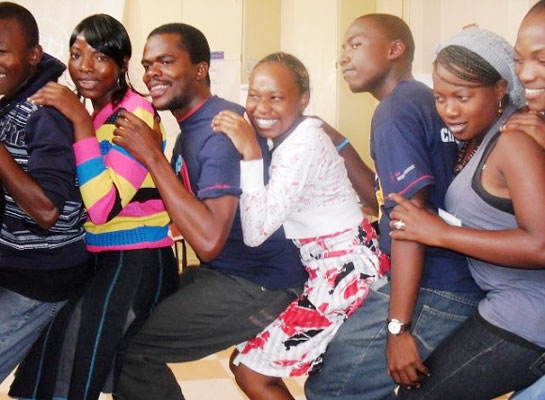
with youth in mindL:by YETT
The Zimbabwean Constitution gives accountability and responsiveness as principles of good governance, which bind the state. Chapter 2 on national objectives further elaborates on the state’s obligation to adopt and implement policies and legislation to develop accountability and transparency in all institutions and agencies of government. This article is based on young people’s online engagements during the Covid-19 lockdown and research on accountability in Zimbabwe. Young people are calling for increased accountability and responsiveness in all governance institutions.
Firstly, it is important to acknowledge young people’s realisation that they have a role to play in promoting accountability and responsiveness in governance.
Young people across the country have heeded the call to stay at home to minimise the spread of Covid-19 in the country. Such responsive move towards the government’s call should be applauded and be accompanied by government’s own responsiveness to young people’s concerns. Secondly, online engagements during the lockdown have revealed young people’s realisation that the price you pay for being an apathetic citizen regarding national issues and processes keeps going up.
This realisation is the basis for this article, which calls for government’s responsiveness and accountability.
In times of crisis, accountability becomes even more important as it has a direct bearing on citizens’ right to life. The right to food, housing, safe and clean water and the right to health care are paramount in a scenario such as this. Also, timeous and accurate information that is transmitted through relevant channels also has an impact on people’s lives. Questions that young people raised in online engagements conducted during the first full week of the lockdown reveal a gap in terms of how institutions choose to share information. Basic information on Covid-19 and platforms that can share accurate information still need to be shared with young people. No person or institution can take for granted the need for accurate and timeous information in such an hour and there is need for responsiveness to the gap in information that remains.
Accountability is important for enjoyment of citizens’ rights. The Auditor-General’s report on Appropriation Accounts, Finance and Revenue Statements and Fund Accounts for 2018 revealed that the security sector had a target of reducing crime by 4% and accidents by 3%. However, crime increased by 20% and accidents by 26%. The Auditor-General appropriately mentioned that citizens may lose confidence in the security sector if criminal cases increase.
In terms of the welfare of citizens, the Harmonised Social Cash transfer funds had to be recalled by Treasury after the Ministry of Labour and Social Welfare was unable to initiate appropriate measures to ensure that intended beneficiaries receive their payouts. It needs to be realised that such moves negatively affect people’s standard of life and the full enjoyment of their rights. It becomes clear that young people’s call for accountability and responsiveness by government are justified. The apprehension that citizens have is justified and government needs to be able to respond appropriately by being accountable in terms of resources that have been availed for the Covid-19 fight and remove the secrecy that seems to surround donations in Zimbabwe. The same dynamism and verve that is used when seeking votes needs to be seen at play at such crucial times. Post-cabinet briefings are important and welcome, but there are more platforms that can be used to engage the largely youthful population.
- Chamisa under fire over US$120K donation
- Mavhunga puts DeMbare into Chibuku quarterfinals
- Pension funds bet on Cabora Bassa oilfields
- Councils defy govt fire tender directive
Keep Reading
Governance institutions have to be responsive and accountable Governance institutions have to respond to national demographics in their make-up. The nature of the problem in Zimbabwe is that despite a youthful population, the governance institutions do not reflect the youthful nature of the national demographic.
A young person’s life cannot be understood by simply reading and the detailed familiarity that is required to make informed policy decisions requires a young person. The Chapter 12 commissions and task forces set up during such periods need to have a youth quota to improve their effectiveness and relevance to local communities. The current national governance institutions may be familiar with the national context, but this knowledge, however excellent in theory, is bound to prove deficient in practice, especially since the youthful population is highly heterogenous. This is not to say older citizens are cast away since their general observations can offer enlightenment.
An argument that can be made is if Zimbabwean institutions were so faultily set up, then how has Zimbabwe survived for so long? Indeed, Zimbabwe presents a unique case of survival but on closer analysis, severe faults are noticed. The lack of a national vision is reflected in how the governance institutions are run and how the country responds to crises. The country also fails to reflect national resilience and has been shown to be vulnerable to international pressures despite its labour being at the forefront of building strong institutions globally. Zimbabwe appears to be rushing somewhere and this article proposes that unless Zimbabwe takes advantage of its youthful population, Zimbabwe is simply rushing to its ruin. This view may seem pessimistic but when one questions the roots of the Mashurugwi scourge and corruption in various institutions that has become the norm, one can see cultural and societal ruin with national values as enshrined within the national constitution being overridden by self-centred personalities.
Young people’s online dialogue sessions have also raised questions on the role the private sector plays in development. The country is made up of a youthful population that is mostly in the informal sector, but insurance packages, housing schemes and medical scheme packages remain fixated on the few formally employed citizens.
The case for accountable and responsive institutions is overwhelming and this crisis is an opportunity to contribute towards developing such institutions.
l For feedback, please send email to [email protected]











